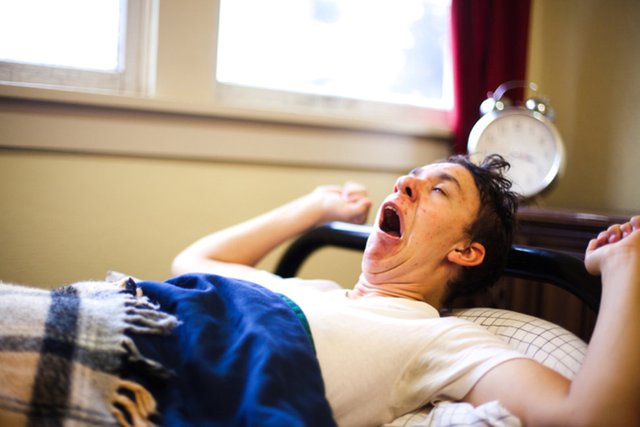what makes waking up early so tough ??
Hello, Steeeemitian:)
waking up is called sleep inertia. A 2013 study in PlosOne describes it as, "a temporary period of reduced alertness and impaired performance." Scientific symptoms of sleep inertia are poor memory and reaction time, inability to perform basic math and the suffering of alertness or attention. These symptoms can persist for an hour, and usually occurs when you wake up during slow-wave sleep.

Sleep comes in order across four stages: Stage One is the transition from wakefulness to a light sleep. During this 5 to 10 minute stage, the electrical signals pulsing through your brain form theta waves. The next 20 minutes is Stage Two; the brain produces rapid bursts of activity called sleep spindles, and then the heart rate slows and body temperature dips. Stage Three is slow wave sleep or delta sleep. This lasts about an hour, and brain activity comes in the form of delta waves. People here normally aren't responsive when you call their name; and abnormal behaviors like bedwetting or sleepwalking are part of the end of this Stage. Stage Four is the famous REM sleep, when dreams happen! When you fall asleep you go through stage one, and then back to Two. Then Two, Three, Four… back to Two. You'll do this four or five times.
If your alarm goes off when you're in stage three, the deepest of sleep, then you'll be jolted awake. And you'll get the worst of sleep inertia! This is usually when people describe feeling like they were "hit by a truck." The hormones surging through your body keeping you in deep sleep are still floating around, affecting your now AWAKE body. Sleep inertia is still being studied, it was only named in the late 70s, so, say it with me now, MORE RESEARCH IS NEEDED! But what we DO know, is the best medicine is to get out of bed and turn on the lights, because the retina is DIRECTLY tied to the suprachiasmatic nucleus (SCN). The SCN controls our sleep-wake cycle and the release of melatonin, which is a hormone that triggers the sleeping part of that cycle. Your phone doesn't count though. It's true that at night the blue light from phone and tablet screens mess with the SCN's regulation of the sleep/wake cycle. (So don't use them before sleep), but a study in PlosOne found that increasing blue light doesn't increase brain alertness during sleep inertia, so grabbing your phone first thing won't save you.
Also, the snooze button is NOT your friend. If you're jolted from slow-wave sleep and allow your brain to drop into sleep again, you'll start the whole cycle over; causing you to feel even WORSE. And don't set alarms every half-hour either, you're not gradually waking yourself up, you're interrupting and restarting your sleep over and over. I'm guilty of this, and so are many of you; but it's the worst.
Like EVERYTHING, having a healthy sleep/wake cycle requires effort -- like running a race, we have to train to be good at it. Waking up is no different. Set one alarm and make yourself wake up when it goes off. Take down the blackout curtains so you get some daylight and your retinas will tell your SCN it's wakeup time. Wake up on the weekend too, so you don't throw off your sleep schedule! A morning routine is the best; and everyone is different, but luckily, wakefulness is easy to train. But only you can do it. I used to be a night owl, but having to be up every morning completely changed me. And… you know what? I kind of love it.
“Mark Twain once wrote, ‘I have tried getting up early, and I have tried getting up late - and the latter agrees with me best.“
Thanks for reading this article and until next time, take care.!

try waking up at 2am in the morning and doing a 12 hour shift. now that is hard work
12 hour shift? how about NO hhh